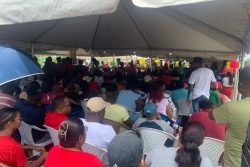It’s the middle of the day. A quite sophisticated Georgetown lady is parked in her car on Church Street, waiting for a friend, with the doors locked and windows up. A scruffy individual approaches the car and says, “Lady, yuh back tyre flat.” Seeing in her outside mirror that the tyre is fine, she realizes it’s a ruse to get her to open her door. She explodes: “Look, boy. Get yuh r—- away from mi kyar, yeh.” Scruffy bolts.
The point, buried in the story, is this: on occasions requiring reasoned and refined expressions we can and do sound like Oxford graduates or products of the Lady Bentley Finishing School, but when severe pain or anger or shock comes into play Caribbean people will automatically resort to the dialect as the best way to convey the depth of our feeling. It’s like flipping a switch.
Time and again, in public or private, when confronted by situations of extreme frustration or trauma, we abandon all the English literature lectures at Saints, and the years at university, and embrace the backyard dialect. It is where the most impact and the strongest connections reside for us. It is where we get the most bang.
 My Bridgetown friend, Vic Fernandes, of Starcom fame, tells about a Bajan, resident many years in the UK, working on a city bus. When a Londoner boards one day and doesn’t deposit a fare, Baje says, very politely, “Excuse me, sir, but you did not pay.” London, very imperious, comes back, “I most certainly did.” Baje, with his best Anthony Hopkins delivery, says, “Well, perhaps you were unaware, sir, but you actually did not pay.” London rocks back on his heels, as the English do, and gives his moustache a twirl: “Young man. You’re out of order. I paid my fare.” Baje goes back to basics. He slams his conductor cap on the floor and shouts, “Gor’ blime, shite; yuh ain’t pay.” Not sure about what he’s heard, but knowing it’s not good, London deposits his fare and scuttles to the back of the bus; the gentleman from Lancashire has run head on into the Bimshire dialect.
My Bridgetown friend, Vic Fernandes, of Starcom fame, tells about a Bajan, resident many years in the UK, working on a city bus. When a Londoner boards one day and doesn’t deposit a fare, Baje says, very politely, “Excuse me, sir, but you did not pay.” London, very imperious, comes back, “I most certainly did.” Baje, with his best Anthony Hopkins delivery, says, “Well, perhaps you were unaware, sir, but you actually did not pay.” London rocks back on his heels, as the English do, and gives his moustache a twirl: “Young man. You’re out of order. I paid my fare.” Baje goes back to basics. He slams his conductor cap on the floor and shouts, “Gor’ blime, shite; yuh ain’t pay.” Not sure about what he’s heard, but knowing it’s not good, London deposits his fare and scuttles to the back of the bus; the gentleman from Lancashire has run head on into the Bimshire dialect.
Similarly, Jamaican higglers, known for their aggressive behaviours, and their proud nationalism, will go home in a flash when confrontations loom. Some years back, I was checking in at LIAT in Antigua. In those days, at each LIAT check-in counter, their list of confirmed passengers was the airline’s airport Bible; regardless of what your ticket said, if your name was not on that airport list you were bounced off the flight. Ahead of me in the line was a Jamaican higgler struggling with two bulging suitcases. When she got to the counter, and she heard the dreaded words, “you are not on the list,” the Jamaican dropped her 40lb carry-on, put her hands on her hips, and screamed “Bumba claat.” The LIAT employee, knowing trouble when he heard it, ducked behind the counter and summoned security.
The combination of factors that can produce these returns to dialect are endless. A Guyanese back from 10 years in New York, sporting the flashy Versace jeans and Air Jordan footwear, goes into Republic Bank on Water Street and changes some US dollars. Back outside, he jumps in a taxi, does the sunshades-flip-back thing and says, “Hey mehn. Take me to 95 Shareef Street.” Taximan says, “Shareef? Oh yuh mean Sheriff Street.” New York comes back, “Whatever. By the way, who’s the President of this country?” Taximan says, “Bharrat Jagdeo. He’s Indian?” “Oh,” says New York, “A lot of Indians here, huh?” Crossing Vlissengen Road, the taxi driver points out, “Dat’s de Guyana Defence Force ’pon de lef’.” Says New York, peering over the sunglasses: “Army, huh. Inneresting.” As they pull up on Sheriff Street, New York says, “Whadda I owe you, dog?” Taximan says, “Eight t’ousand dollah.” New York sits bolt upright: “Whuh? Yuh is a madman or whuh? Look buddy, I from Punt Trench Dam; I grow up eating phulouri. Don’ gimme no whup whap story ‘bout eight t’ousand. Ketch yuhself, banna.” (Under dialect, the eight quickly became four.)
If you’re around a West Indian when he hits his thumb with a hammer, or gets in a car accident, or finds his woman with another man, you will notice that Standard English goes right out the window. In those circumstances, even the lawyer with the briefcase from Croal Street, or the university professor, or the Pradoville resident will go back to their roots as the refinedpronunciations disappear, references to each other’s parents fly around, and the street language bounces back and forth. In times of stress, Standard English may work for other English speakers; for Caribbean folks, when stronger and more fundamental expression is needed for the proper emphasis, we have the advantage of such a language in our dialect, and we go to it.
It is also true that when we want to make a very narrow point most forcefully the dialect words are often superior. When an object falls in the water, for instance, what Standard English wordage conveys that action better than our “badash”? As anyone with the problem will tell you, the dictionary word “constipation” does not carry anywhere near the pungency of “cork up.” A friend reporting on a cricket game tells you, “Gayle hit him, whackaks, out the ground.” Try as you may, you cannot improve on the image presented by that one word “whackacks”; it is perfection.
In the end, any academics among us who continue to decry dialect speech in the area of “effective communication” need to take another look: in moments of agony, or stress, or for the most economical use of language, those visceral dialect expressions are exactly that – our most effective way to communicate with each other.
Example: Christine is relating to Carol an incident involving her helper whom she caught stealing. “Girl, it was red-handed. I came in the kitchen and caught her trying to slip some tea bags in her pocket.” Says Carol: “Wha’. So what you did? Christine: “What I did? I told her: you working here for years, I pay you good, and you stealing from me?” Carol: “So what she said? Christine: “Girl! She ain’t even voomps on me.
“Voomps” – try conveying that reaction better using Standard English







